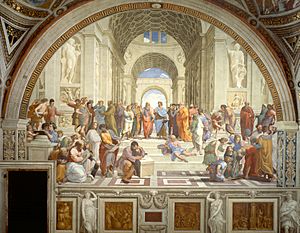Ancient Greek philosophy facts for kids

Ancient Greek philosophy is a way of thinking about the world that started in Greece around 600 years before Jesus was born (6th century BC). It continued through the Hellenistic period and the Roman Empire. The word "philosophy" itself comes from Greece. Back then, it included many subjects like science, math, politics, and how people should live (ethics).
Greek philosophy is a very important part of Western culture. Its ideas have influenced many different times and places, including Rome, Islamic philosophy, the Renaissance, and the Age of Enlightenment.
Some people think Greek philosophy might have been influenced a little by ideas from the ancient Near East. The most famous Greek philosophers are Socrates, Plato, and Aristotle. Even Alexander the Great learned about Greek philosophy before he conquered the Persian empire.
Many philosophers believed that math was key to understanding everything. Euclid was one of the most important thinkers in math. He wrote a famous book about geometry called The Elements.
Contents
Early Greek Thinkers
Before Socrates, there were many thinkers called Sophists. One well-known Sophist was Protagoras. We mostly know about them from what Socrates said about their ideas.
Pythagoras was another early thinker. He might have been a mystic (someone who believes in spiritual truths) or a rationalist (someone who believes in reason). We don't know much about him, but he is famous for the Pythagorean theorem in math.
Famous Greek Philosophers
Socrates
Socrates was born in Athens in the 5th century BCE. He was a very important philosopher. Athens was a big center for learning, and people went there to discuss ideas. However, talking about certain ideas became risky. Socrates was put on trial and sentenced to death in 399 BCE because some people felt his ideas challenged their way of life.
Socrates is known as the founder of political philosophy. He often ended his discussions without a clear answer. This way of asking questions to make people think is called the Socratic method.
Socrates believed that no one truly wants to do bad things. If someone does something wrong, it's usually because they don't know any better. He thought that being good (virtue) was the same as having knowledge. He often said he knew very little himself.
Socrates' ideas influenced Plato, who wrote down many of Socrates' conversations. Plato's student, Aristotle, was also influenced by these ideas. Their thoughts later shaped the Roman Empire, the Islamic Golden Age, and the Renaissance.
Plato
Plato was also from Athens. He lived a generation after Socrates. He wrote many dialogues (conversations) and some letters, with Socrates often being a main character. Along with Xenophon, Plato is our main source of information about Socrates' life. Socrates was known for using irony and not always sharing his own opinions directly.
Plato wrote important books like Republic, Laws, and Statesman. In The Republic, he suggested that cities would only be fair if they were led by "philosopher kings." He also wrote that people in power should share their belongings, and sometimes leaders might need to tell "noble lies" for the good of everyone. However, Plato also thought that such a city might be impossible to create.
Plato is famous for his theory of forms. This idea suggests that there are perfect, non-physical ideas (like "beauty" or "justice") that are more real than the things we see in the world around us.
Aristotle
Aristotle moved to Athens in 367 BC to study philosophy. He studied at Plato's Academy for twenty years. Later, he left Athens to study botany (plants) and zoology (animals). He even became a teacher to Alexander the Great. After ten years, he returned to Athens and started his own school called the Lyceum.
We still have at least twenty-nine of Aristotle's books. He wrote about many subjects, including logic (how to reason), physics (how things work), optics (light), metaphysics (the nature of reality), ethics (right and wrong), rhetoric (persuasive speaking), politics, poetry, and the study of plants and animals.
Aristotle sometimes disagreed with his teacher, Plato. He criticized Plato's ideas about government and called the theory of forms "empty words." Aristotle was more interested in observing the world and practical matters.
Aristotle's ideas weren't super popular right after his time. But later, his work became very important. It influenced Islamic, Jewish, and Christian philosophy. Famous thinkers like Avicenna called him "the Master," and others like Thomas Aquinas simply called him "the Philosopher."
Hellenistic Philosophy
During the Hellenistic period and the Roman Empire, many new ways of thinking appeared. People from Greece, Rome, Egypt, Syria, and Arabia all contributed. Ideas from Persian and Indian philosophy also played a part.
As Christianity and later Islam spread, so did Hellenistic philosophy. It influenced the three main Abrahamic religions: Jewish, Christian, and early Islamic philosophy.
Greek Ideas in the Middle Ages
During the Middle Ages, many Greek ideas were forgotten in Western Europe. This was because of a time called the Migration period, when fewer people could read and write. However, in the Byzantine Empire, Greek ideas were kept safe and studied.
After Islam grew, the Abbasid rulers started translating Greek philosophy into Arabic. Islamic philosophers like Al-Kindi, Al-Farabi, Ibn Sina (Avicenna), and Ibn Rushd (Averroes) studied and added their own ideas to these works.
Later, during the High Middle Ages, Greek philosophy came back to Western Europe. This happened through translations from Arabic into Latin, and also from the Byzantine Empire. These old philosophies, along with new Arabic writings, greatly influenced thinkers like Thomas Aquinas in Europe.
Related pages
Images for kids
See also
 In Spanish: Filosofía griega para niños
In Spanish: Filosofía griega para niños
 | Audre Lorde |
 | John Berry Meachum |
 | Ferdinand Lee Barnett |


